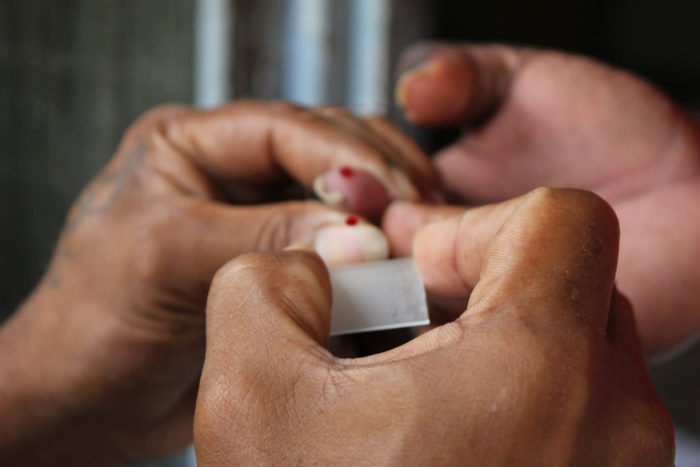Vaccine targets identified for deadly form of malaria
Paves the way for vaccine for disease that kills thousands each year
 Jeremy Miller/AusAID
Jeremy Miller/AusAIDResearchers at Washington University School of Medicine in St. Louis have identified a potential vaccine target against Plasmodium vivax, a parasite that causes malaria in millions of people worldwide every year. Above, health workers in the Solomon Islands take a drop of blood to screen for malaria parasites.
Thousands died and more than 13 million people fell ill with malaria caused by the parasite Plasmodium vivax last year. There is no vaccine for the disease, partly because multiple strains of P. vivax circulate globally, making it difficult to develop a vaccine that protects against all varieties.
Now, researchers studying a protein crucial for the parasite’s survival have found two portions of that protein that do not vary across many strains. Moreover, antibodies against these portions of the protein protect against disease, according to researchers at Washington University School of Medicine in St. Louis. The findings could be the basis of a vaccine for P. vivax malaria, the most deadly form of malaria outside of Africa.
The study is available online in the Proceedings of the National Academy of Sciences.

“This protein – called Duffy binding protein – is the most promising target for vaccine development because it is almost impossible for the parasite to cause infection without it,” said Niraj Tolia, PhD, an associate professor of molecular microbiology and the study’s senior author. “But the Duffy binding protein is very variable among strains of P. vivax circulating throughout the world. Any vaccine that is going to have an impact needs to be effective against all the variants.”
P. vivax gets inside human cells by latching its binding protein onto a human protein located on immature red blood cells. If the parasite does not bind to the human protein – either because antibodies block the binding site or because the human protein is missing – the parasite is unable to cause disease. P. vivax is found all over the world, but it causes relatively little disease in Africa, where many people lack this specific protein on their red blood cells.
Tolia and colleagues studied three antibodies that are known to prevent a range of binding proteins from latching on to the human protein, and identified the portion of the binding protein to which the antibodies were bound. Two antibodies bound to the same portion, or epitope, while the third bound at another spot.
Then, the researchers analyzed 511 binding protein sequences from strains around the world and found that both epitopes were 90 to 95 percent conserved, meaning that a vaccine that targeted those epitopes should be protective against nearly all P. vivax strains.
“Our study helps define what we should be targeting to get universal protection,” Tolia said. “The next step will be to actually make a vaccine against these targets and see if it works.”







